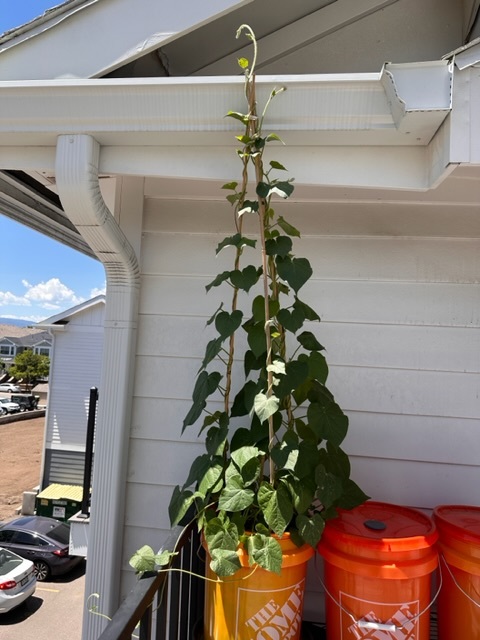For apartment dwellers, people with HOA restrictions, etc
What easy steps can we take to live solarpunk?
- go vegan
- buy second hand
- reapir things you own that broke
- switch to some sort of green electricity
- small scale indoor gardening of som herbs, tomatoes or other similar plants easily grown on a balcony or within the kitchen
- political action like local protests or even better get elected
- volunteer work in some sort of progressive charity
- organize a tenenant union or become active in the hoa
There is plenty more, the key is to make the world better and not try to make it perfect. A lot of usefull action is community driven and in those roles you can have a much much bigger impact then by just changing your own way of life.
Ride a bike :)
Something simple I had done was that I invested in USB powered grow lights for my indoor plants, as the apartment I had a few years ago was in the worst position for getting light. If you have a good window, feel free to set up something small for now, some herbs or even flowers for just adding a bit of nature into your life. People mentioned the different options for composting, which I agree with as well. The idea of setting up portable solar panels if you can afford them, for little stuff is a good idea too. It is really up to you, what you feel you can do and start with! A big part also is that solarpunk isn’t just at home, it also is in the community.
It might sound reductionist, but start with the basics, and realize that a lot of people do the basics wrong. The basics are:
- Reduce
- Reuse
- Recycle
In that order. That’s the part people screw up the most. They want to start with recycling, then move to reuse, and THEN reduce. In addition, there’s also
{:start=“4”} 4. Renew
In which you take into consideration replenishing the earth with the resources you’ve consumed.
Guerilla gardening
Guerilla gardening is find a scrap of land that’s being wasted and turn it green, in the hopes that whoever owns it won’t care or can’t be bothered to tear up what you’ve planted.
Whatever it is that you plant, if you intend for it to be a source of food or shade, you should intend for it to be permanent, and able to survive without your continued care. Ideally fruit or nut trees, berry bushes if trees are not an option and if all else fails perennial vegetables, herbs or flowers. Even something as simple as clover is going to help your local pollinators. Time is a big factor. Do you expect your plants will last a season? Will they get dug up next year? You don’t want your effort, or these plants, to go to waste, so don’t commit a row of fruit trees to the earth when you know soon enough they would be destroyed mindlessly. If all you’ve got is a summer, go ahead and plant annuals. Throw down those tomatoes, plant some corn. Be showy, so the locals begin to realize what could have been.
Regardless of how long you expect your gardening to last, how you go about it is another key idea. There are two simple ways: you belong there, or you were never there.
You Belong There:
This is an easy enough outfit: jeans, work boots, and a reflective vest will keep most people from second-guessing you. If more than one of you are out and about on a piece of land, try to match your shirt to add even more legitimacy. Cap this off with a truck and some equipment and you’ll be virtually invisible to anyone. Make sure one of you is doing all the work while the other lounges by the cooler with some Oakleys on.
You Were Never There:
Obviously enough, here you’re trying to not be seen. Plant at night or in a secluded area. Guerilla gardening doesn’t mean you’re just taking over a median or a patch of grass beside an exit - you might be taking advantage of extant green space, as well. Say you’ve got a patch of park that’s disused, and nothing but grass? Make it worth the space. And again, it doesn’t have to be an orchard to be successful guerrilla gardening. Red clover can go a long way toward improving soil, and helping out the area bee population.
If you’re planting near roads or industrial areas, it’s best to test the soil before you try to plant anything edible. If the soil is in question, there are a variety of plants capable of phytoremediation - meaning the plant can help clean up the place. Just be sure to pull the plants and dispose of them properly rather than let them decompose in place, thus returning the contaminant to the earth.
Join a composting co-op if you don’t have room to compost. Mine is a couple bucks a month, and they pick up the compost bucket every other week. Twice a year I can get back processed compost ready for my backyard garden. As a city-dweller with a very small yard and no space to compost, it’s been fantastic.
I had an idea I wanted to share, in my town we have food coops, which is small group of people who band together to get local produce from farmers, with a focus on it being sustainable too so I‘ve seen they even go with bikes to get it. Though you have to contribute in work too, but it‘s probably better than the stuff in supermarkets environmentally.
I heard about this and thought about joining but been too shy so far, maybe this will finally push me to go apply.
Find ways to reduce your energy consumption:
- Buy higher quality clothes, ideally less imported.
- If you can, plant vegetables and stuff that you can eat or shop at local farmer’s markets.
- Reduce water use
- Cut back on things that use plastics in abundance



Start by learning the fundamentals of how solar actually works at a technical level. The pictures show parts and results of a completely solar powered automatic watering system I built.
It is battery powered and cost about $75 USD. It has been up now consistently for 36 days since it last reset. Once you understand the fundamentals, larger systems operate on the same principles.
A world powered by solar (and other intermittent renewable sources) will have to look different than our current world because of the challenges inherent to renewables. We want power 24/7 (and we can have it) but we will have to re-build the world to accommodate it. That’s pretty punk in my book.
Do you have recommendations for a beginner solar kit? I am very interested in small project/portable solar and saw Home Depot even had kits these days but didn’t know if they were any good…
Sure, a little kit is a cost-effective way to start, if you consider yourself a true beginner. Most kits are aimed at a young market. Find one that is more science and electronics oriented than toy-oriented, in hopes you’ll learn better fundamentals.
If you are a bit further along, you might be better off dipping into microcontrollers or raspberry pi projects, of which there are a million.
Don’t overbuy, but don’t skimp when it comes to tools. No need for a premium soldering iron, but the mid level model is a better bet than the lowest price item, for instance.
If you aspire to really make something ambitious, check out adafruit and sparkfun. They have entry level kits and modular projects where you get into electronics and programming.
I meant the 600 watt panel/battery/AC inverter kits meant for RVs lol
I think you’re thinking breadboard kits for children?
Yep, that’s what I was assuming. Ha! The kits you are talking about are highly abundant too and very special purpose. Since the original post was about low cost easy ways to be solarpunk, I was going for hobbyist scale projects like mine.
It sounds like you are talking about something with real practical power generation ability, at least for camping or van life? Just do your homework and understand the fundamentals so you don’t damage your expensive batteries, I guess. The kits are all very different and special purpose so it really depends on your application.





